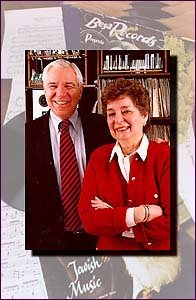The Robert and Molly Freedman Jewish Music Archive
About the Collection
Robert and Molly Freedman's 35-year dedication to the study of Yiddish music has resulted in what is largely regarded as the world's premier private collection of this genre. The University of Pennsylvania Library is the beneficiary of their years of commitment to collection and cataloging, having recently acquired the Freedmans' archive of more than 3,000 Yiddish folk and art songs, theater music, comedy, and klezmer music in songbooks, reference works and sound recordings.
In what scholars consider an incomparable resource, the Freedmans have created and maintained a database of more than 25,000 entries which exhaustively index the bulk of the collection. The database, in English and Yiddish, is capable of referencing artists, titles, literary and Biblical references, poems and other catagories of particular interest.
According to Dr. Kathryn Hellerstein, who heads Penn's Yiddish program, the database makes this a singularly valuable resource: "Thanks to the archive's ingenious index, it is possible to compare various settings and renditions of familiar songs as well as to discover unknown settings of Yiddish literature to music. Popular or highbrow, famous or obscure, the music in this collection is a key to Jewish life in Europe and America in the twentieth century."
The collection, known as the Robert and Molly Freedman Jewish Music Archive, is housed in the Library's Annenberg Rare Book and Manuscript Library.
About the Collection
Robert and Molly Freedman's 35-year dedication to the study of Yiddish music has resulted in what is largely regarded as the world's premier private collection of this genre. The University of Pennsylvania Library is the beneficiary of their years of commitment to collection and cataloging, having recently acquired the Freedmans' archive of more than 3,000 Yiddish folk and art songs, theater music, comedy, and klezmer music in songbooks, reference works and sound recordings.
In what scholars consider an incomparable resource, the Freedmans have created and maintained a database of more than 25,000 entries which exhaustively index the bulk of the collection. The database, in English and Yiddish, is capable of referencing artists, titles, literary and Biblical references, poems and other catagories of particular interest.
According to Dr. Kathryn Hellerstein, who heads Penn's Yiddish program, the database makes this a singularly valuable resource: "Thanks to the archive's ingenious index, it is possible to compare various settings and renditions of familiar songs as well as to discover unknown settings of Yiddish literature to music. Popular or highbrow, famous or obscure, the music in this collection is a key to Jewish life in Europe and America in the twentieth century."
The collection, known as the Robert and Molly Freedman Jewish Music Archive, is housed in the Library's Annenberg Rare Book and Manuscript Library.
About the Freedmans

Robert, an alumnus of the Penn Law School ('54), and Molly Freedman are natives of the Philadelphia area who, in 1959, began collecting the music and artifacts that would become the world's leading private collection of Yiddish music. Their efforts began at a time in which Yiddish as a living language and culture seemed to be ebbing, in comparison with contemporary developments. The current surge of interest and creative activity in Yiddish language, literature and music has been generated--internationally and in the United States--by an unlikely combination of youthful academics and performing artists for whom the Freedmans and their collection have been resources.
The Freedmans' dedication to the collection and preservation of American and European Yiddish music in the twentieth century has taken them around the world in search of rare 78s, LPs, cassettes and disks of recorded sound. Although preserving Yiddish culture has been an aspect of their project, more important for the Freedmans has been the sheer enjoyment they take in listening to Yiddish music and sharing it with others.
"Molly and I associate the music with happy childhood memories, festive occasions, and family. I have memories of my parents and their friends singing together in a tiny, crowded living room in our home," Bob recalled. Molly remembers with fondness her mother singing Yiddish and Russian songs while doing household chores, and her father often playing recordings of Yiddish concerts and art songs.
For three decades, the Freedmans' suburban home, and later, their apartment on Philadelphia's Rittenhouse Square, had served as an informal research center for scholars visiting the archive from around the country and around the world. Penn faculty had held classes there, as well. Now, with the collection housed at the University of Pennsylvania Library's Annenberg Rare Book and Manuscript Library, the archive will still be close to the Freedmans, where they will continue to provide the same distinguished reference service they had offered from their home.
The Freedmans' dedication to the collection and preservation of American and European Yiddish music in the twentieth century has taken them around the world in search of rare 78s, LPs, cassettes and disks of recorded sound. Although preserving Yiddish culture has been an aspect of their project, more important for the Freedmans has been the sheer enjoyment they take in listening to Yiddish music and sharing it with others.
"Molly and I associate the music with happy childhood memories, festive occasions, and family. I have memories of my parents and their friends singing together in a tiny, crowded living room in our home," Bob recalled. Molly remembers with fondness her mother singing Yiddish and Russian songs while doing household chores, and her father often playing recordings of Yiddish concerts and art songs.
For three decades, the Freedmans' suburban home, and later, their apartment on Philadelphia's Rittenhouse Square, had served as an informal research center for scholars visiting the archive from around the country and around the world. Penn faculty had held classes there, as well. Now, with the collection housed at the University of Pennsylvania Library's Annenberg Rare Book and Manuscript Library, the archive will still be close to the Freedmans, where they will continue to provide the same distinguished reference service they had offered from their home.
